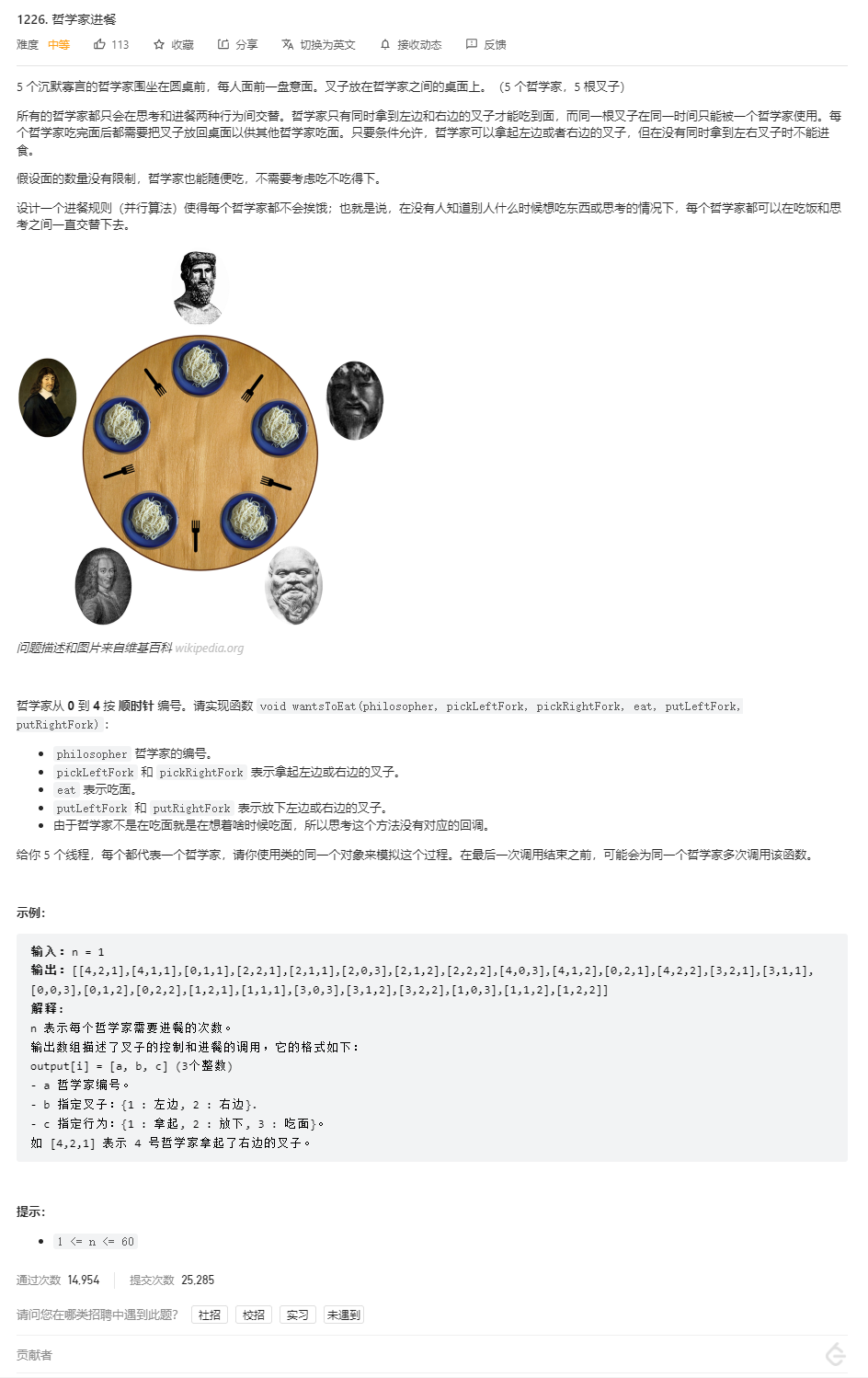🌕 🌗 1226. 哲学家进餐
2022年6月20日
- algorithm
🌕 🌗 1226. 哲学家进餐
难度: 🌕 🌗
问题描述

解法 1 - Semaphore
class DiningPhilosophers {
// 思路:
// 5 把叉子可以看成是 5 把锁,每把锁只能被一个线程占有
// 可以用 ReentrantLock 数组表示
// 要想解决这个问题,就是说,怎么打破死锁的条件
// 由于互斥 & 不可剥夺条件已经定死,可以考虑 如何请求并占有 以及 循环等待
// method 1 - 限制同时最多只能 4 名哲学家用餐,超出的第 5 名哲学家只能阻塞
ReentrantLock[] list;
Semaphore s;
public DiningPhilosophers() {
this.list = new ReentrantLock[5];
for(int i = 0; i < 5; i ++) {
this.list[i] = new ReentrantLock();
}
this.s = new Semaphore(4); // 只要 <= 4 的值可以保证不会出现死锁
}
// call the run() method of any runnable to execute its code
public void wantsToEat(int philosopher,
Runnable pickLeftFork,
Runnable pickRightFork,
Runnable eat,
Runnable putLeftFork,
Runnable putRightFork) throws InterruptedException {
s.acquire(); // 在拿叉子之前首先得保证并发人数 < 5
// 拿 左右叉子
int left = philosopher;
int right = (philosopher + 1) % 5; // +1 比 -1 要简单些,否则左右都要再 + 5防止出现负数
list[left].lock();
list[right].lock();
pickLeftFork.run();
pickRightFork.run();
eat.run();
putLeftFork.run();
putRightFork.run();
list[left].unlock();
list[right].unlock();
s.release();
}
}
解法 2 - ReentrantLock
class DiningPhilosophers {
// 思路:
// 5 把叉子可以看成是 5 把锁,每把锁只能被一个线程占有
// 可以用 ReentrantLock 数组表示
// 要想解决这个问题,就是说,怎么打破死锁的条件
// 由于互斥 & 不可剥夺条件已经定死,可以考虑 如何请求并占有 以及 循环等待
// method 1 - 拿起左右叉子之前需要先获取 doubleLock 锁
ReentrantLock[] list;
ReentrantLock doubleLock;
public DiningPhilosophers() {
this.list = new ReentrantLock[5];
for(int i = 0; i < 5; i ++) {
this.list[i] = new ReentrantLock();
}
this.doubleLock = new ReentrantLock();
}
// call the run() method of any runnable to execute its code
public void wantsToEat(int philosopher,
Runnable pickLeftFork,
Runnable pickRightFork,
Runnable eat,
Runnable putLeftFork,
Runnable putRightFork) throws InterruptedException {
doubleLock.lock(); // 在拿叉子之前首先得获得同时获得 2 把锁的资格
// 拿 左右叉子
int left = philosopher;
int right = (philosopher + 1) % 5; // +1 比 -1 要简单些,否则左右都要再 + 5防止出现负数
list[left].lock();
list[right].lock();
pickLeftFork.run();
pickRightFork.run();
doubleLock.unlock(); // 在这里提前释放,可以让其他哲学家早点拿自己想要的钥匙
eat.run();
putLeftFork.run();
putRightFork.run();
list[left].unlock();
list[right].unlock();
}
}
解法 3 - 只允许一个哲学家同时用餐
class DiningPhilosophers {
// 思路:
// 5 把叉子可以看成是 5 把锁,每把锁只能被一个线程占有
// 可以用 ReentrantLock 数组表示
// 要想解决这个问题,就是说,怎么打破死锁的条件
// 由于互斥 & 不可剥夺条件已经定死,可以考虑 如何请求并占有 以及 循环等待
// method 3 - 单线程肯定安全,只允许一个哲学家可以同一时间用餐
// ReentrantLock[] list;
ReentrantLock doubleLock;
public DiningPhilosophers() {
// this.list = new ReentrantLock[5];
this.doubleLock = new ReentrantLock();
}
// call the run() method of any runnable to execute its code
public void wantsToEat(int philosopher,
Runnable pickLeftFork,
Runnable pickRightFork,
Runnable eat,
Runnable putLeftFork,
Runnable putRightFork) throws InterruptedException {
doubleLock.lock(); // 在拿叉子之前首先得获得同时获得 2 把锁的资格
// 拿 左右叉子
int left = philosopher;
int right = (philosopher + 1) % 5; // +1 比 -1 要简单些,否则左右都要再 + 5防止出现负数
pickLeftFork.run();
pickRightFork.run();
eat.run();
putLeftFork.run();
putRightFork.run();
doubleLock.unlock(); // 此时也不需要给叉子加锁了
}
}
解法 4 - 打破循环等待
class DiningPhilosophers {
// 思路:
// 5 把叉子可以看成是 5 把锁,每把锁只能被一个线程占有
// 可以用 ReentrantLock 数组表示
// 要想解决这个问题,就是说,怎么打破死锁的条件
// 由于互斥 & 不可剥夺条件已经定死,可以考虑 如何请求并占有 以及 循环等待
// method 4 - 打破循环等待条件,只有 5 个哲学家同时都拿左叉子 | 右叉子才会出现死锁,
// 只要保证5个哲学家部分先拿左边,部分先拿右边就可以打破
ReentrantLock[] list;
public DiningPhilosophers() {
this.list = new ReentrantLock[5];
for(int i = 0; i < 5; i ++) {
this.list[i] = new ReentrantLock();
}
}
// call the run() method of any runnable to execute its code
public void wantsToEat(int philosopher,
Runnable pickLeftFork,
Runnable pickRightFork,
Runnable eat,
Runnable putLeftFork,
Runnable putRightFork) throws InterruptedException {
// 拿 左右叉子 - 奇数哲学家先拿左边叉子,偶数哲学家先拿右边叉子
int left = philosopher;
int right = (philosopher + 1) % 5; // +1 比 -1 要简单些,否则左右都要再 + 5防止出现负数
if((philosopher & 1) == 1) {
list[left].lock();
list[right].lock();
} else {
list[right].lock();
list[left].lock();
}
pickLeftFork.run();
pickRightFork.run();
eat.run();
putLeftFork.run();
putRightFork.run();
if((philosopher & 1) == 1) {
list[left].unlock();
list[right].unlock();
} else {
list[right].unlock();
list[left].unlock();
}
}
}